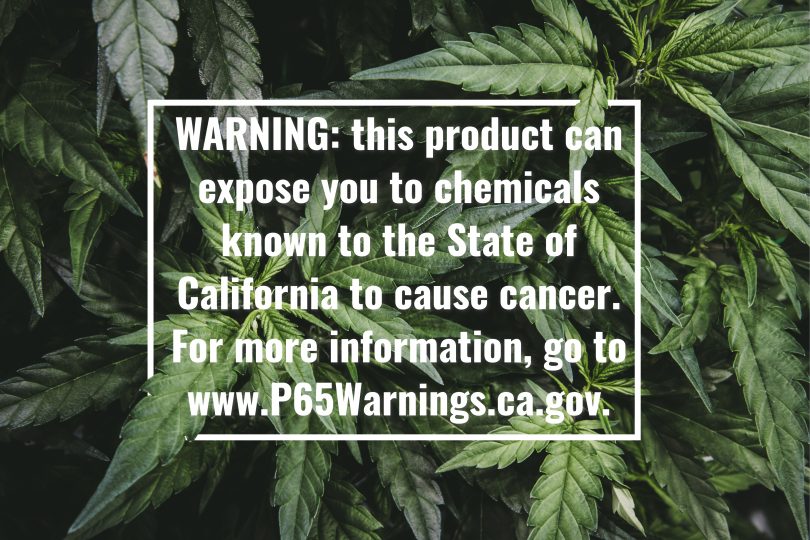Starting January 3rd, all cannabis products sold in California will now require a Prop 65 warning on the label, a move that will likely spark an influx of product-liability lawsuits within the industry.
In theory, health warning labels are a good thing – they alert consumers that the product they are buying can potentially have an impact on their health. However, in practice, they lead to overregulation, frivolous lawsuits, and many California consumers have started to ignore them because they can be vague and are so liberally applied.
The Proposition 65 labels date back to the mid-80s and applies to any product that contains known toxins or carcinogens, even if the amounts are trace and research is inconclusive. Once the new mandate goes into effect next month, all products that create “marijuana smoke”, as well as those containing Delta-9 THC will need a warning label. This covers pretty much every product in the legal market, minus CBD (cannabidiol) or CBG (cannabigerol) topicals and edibles.
Legal experts say that these types of mandates are often enforced by private attorneys and plaintiffs rather than state regulators. This practice was initially intended to keep the court system from backlogging over minor cases, but it has transformed into a sort of under-the-radar industry that preys on small business owners.
“The bounty hunters (people who go to stores specifically to look for unlabeled products) will be able to start regulating and enforcing those come Jan. 3, 2021,” Anne Marie Ellis, an Orange County attorney who specializes in product liability, said during a webinar in early December.
To learn more about cannabis, and for exclusive deals on flowers and other products, subscribe to The CBD Flowers Weekly Newsletter
A little bit about Prop 65
Proposition 65, formally known as the Safe Drinking Water and Toxic Enforcement Act of 1986, was established to protect California’s drinking water sources contamination by chemicals known to cause cancer, birth defects, or other reproductive harm, and it requires business to keep and current list (which is updated regularly) of chemicals that cause these reactions.
The program has expanded in the last couple decades and you can find Prop 65 warnings on everything from food items, children’s toys, hygiene products, and even entire buildings (for example, my local Wal-Mart has a Prop 65 warning stating that chemicals within the building are known carcinogens).
Additionally, there is no penalty for posting an unnecessary sign, which leads to vague and overused warnings that rarely resonate with the consumer. It’s for these reasons, among others, that the law has been harshly denounced over the years with critics saying it causes “over-warning” and “meaningless warnings”. These sentiments have been backed in numerous court cases as well.
Applying it to the cannabis industry
Again, starting January 3rd all products the create cannabis smoke and/or contain THC will be subject to the new law. The labels these new products will be sporting can come in two different formats: a standard warning or a short-form version.
The standard warning is quite long and a bit more detailed, while the short version is straight to the point and intended for smaller products. Most likely, you will see more of the short-form version on dispensary products, and this version reads: “WARNING: Cancer and Reproductive Harm – www.P65Warnings.ca.gov.” Short and ominous.
“If a product doesn’t have the warning on its actual packaging, then the alert must be placed somewhere obvious so consumers can see it,” Ellis said. “And because both marijuana smoke and THC are about to be triggers for Prop 65 requirements, literally every company that does business in California needs to comply with the law, not just companies that produce smokable cannabis products.”
This will include many noncombustible products such as edibles, topicals, and vapes, unless they both, contain isolated CBD or other non-psychoactive cannabinoids AND do not produce any smoke during consumption.
Prop 65 laws and litigations aren’t new to the Golden State cannabis industry, however. Cannabis smoke has been on the state’s list of carcinogens since 2009, and THC since 2018. In January 2020, a ruling by the California Office of Environmental Health Hazard Enforcement listed both as potential reproductive toxins.
Conflicting research on THC and cancer
Now, about this issue of THC (tetrahydrocannabinol) being named a carcinogen. The existing studies on this are conflicting but overall, research indicates that it’s helpful, not harmful. For example, a number of small studies found that inhaled cannabis is helpful in treating nausea and pain (especially neuropathic) associated with chemotherapy.
More recent studies have even documented THC and other cannabinoids as cancer inhibitors, noting that they can slow the growth and/or cause death in certain types of cancer cells. This was demonstrated numerous times in lab petri dishes as well as live-animal studies.
In Israel, research on the medicinal use of cannabinoids has been going on for decades. Just last year, Professor Raphael Mechoulam from Hebrew University of Jerusalem received a $2,000,000 grant for just this purpose.
Mechoulam is leading a research team to work on developing cannabis-based treatments for three aggressive forms of cancer: melanoma (skin cancer), neuroblastoma (cancer originating in the surrounding and mostly neural system in children), and glaublastoma (brain cancer).
I did come across one study that suggested cannabis exposure may increase the “susceptibility to and/or incidence of breast cancer as well as other cancers that do not express cannabinoid receptors and are resistant to Delta9-THC-induced apoptosis.” In this scenario, it refers to very specific types of cancer and more research is definitely needed.
Liabilities and lawsuits
According to Ellis, the main issue businesses will face once this law goes into effect is the cannabis industry “bounty hunters” who are basically undercover shoppers that will look for cannabis products in dispensaries that are not in compliance with the new mandate. In these situations, they will often file a “notice of violation” and push for a settlement out of court – so in other words, they’re looking for money.
“This is low-hanging fruit for lawyers who want to make a quick buck and don’t want to do a lot of work,” said Lara DeCaro, a San Francisco attorney who represents numerous cannabis businesses. “Most legal marijuana businesses are already complying with the Prop 65 labelling mandate because such requirements have been on most companies’ radars for a long time.” Nevertheless, she expects there will be an influx of legal complaints who target the “industry stragglers” who are waiting until the last minute to get up to speed.
There are many attorneys who make their living working Prop 65 cases in other industries, since it covers all consumer products and businesses and the list exceeds 1,000 chemicals that are considered dangerous. Roughly 90% of Prop 65 cases – across all industries – are settled out of court. Fines for companies who are in violation can be up $2,500 per product, daily. So if you have 3 non-compliant products, you’re looking at $7,500 in fines every single day until you remedy the situation.
“They will go around, much like they do under the (Americans with Disabilities Act) and find violations and then file numerous complaints,” DeCaro said. “Whether or not those complaints end up having merit, they’re going to name a bunch of people, and defendants will throw a few thousand dollars at it just to make it go away. It’s a cost-benefit analysis at that point. Am I going to spend $20,000 on a lawyer to fight it and get it kicked out, or am I just going to spend $3,000 at it and make the person go away?”
What the future holds
Although this may come as a shock to some of the newer businesses or those that aren’t particularly worried about the logistics of working in the industry, but for the most part, the word is out and most cannabusiness owners are well-prepared for January 3rd.
“The industry is aware. There’s been a fairly good job of discussing the need for Prop 65,” said Pamela Epstein, attorney for Oakland-based Eden Enterprises and a board member of the California Cannabis Industry Association. “Prop 65 is generally on most checklists for incoming and outgoing product at the manufacturing and distribution and retail level, so they should be ready.”
Overall, people are prepared for Prop 65 to hit the California cannabis industry . But for those that aren’t, it could end up being a very costly mistake so you’ll want to do everything you can to get compliant by the beginning of next month.









